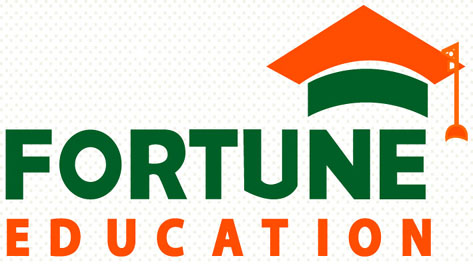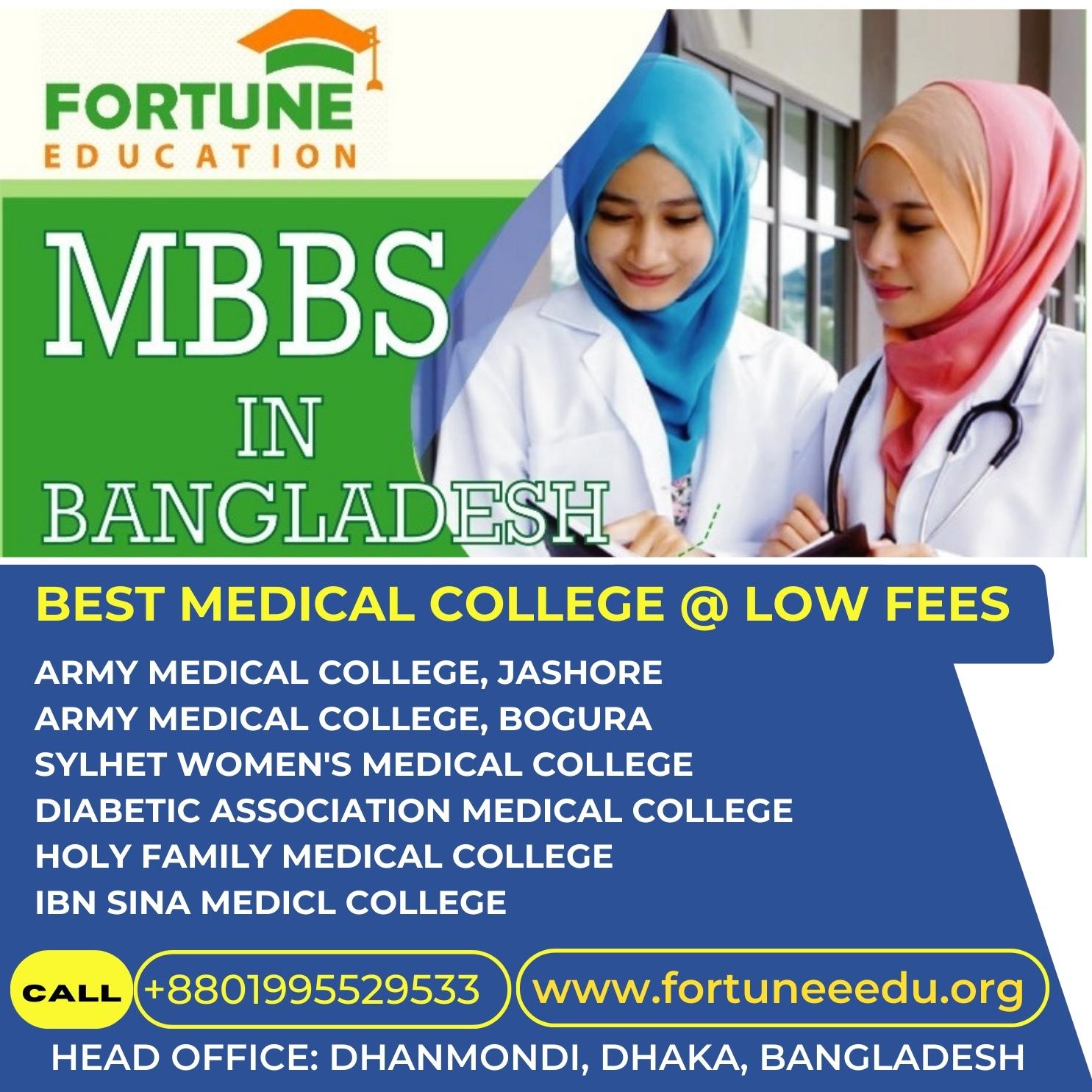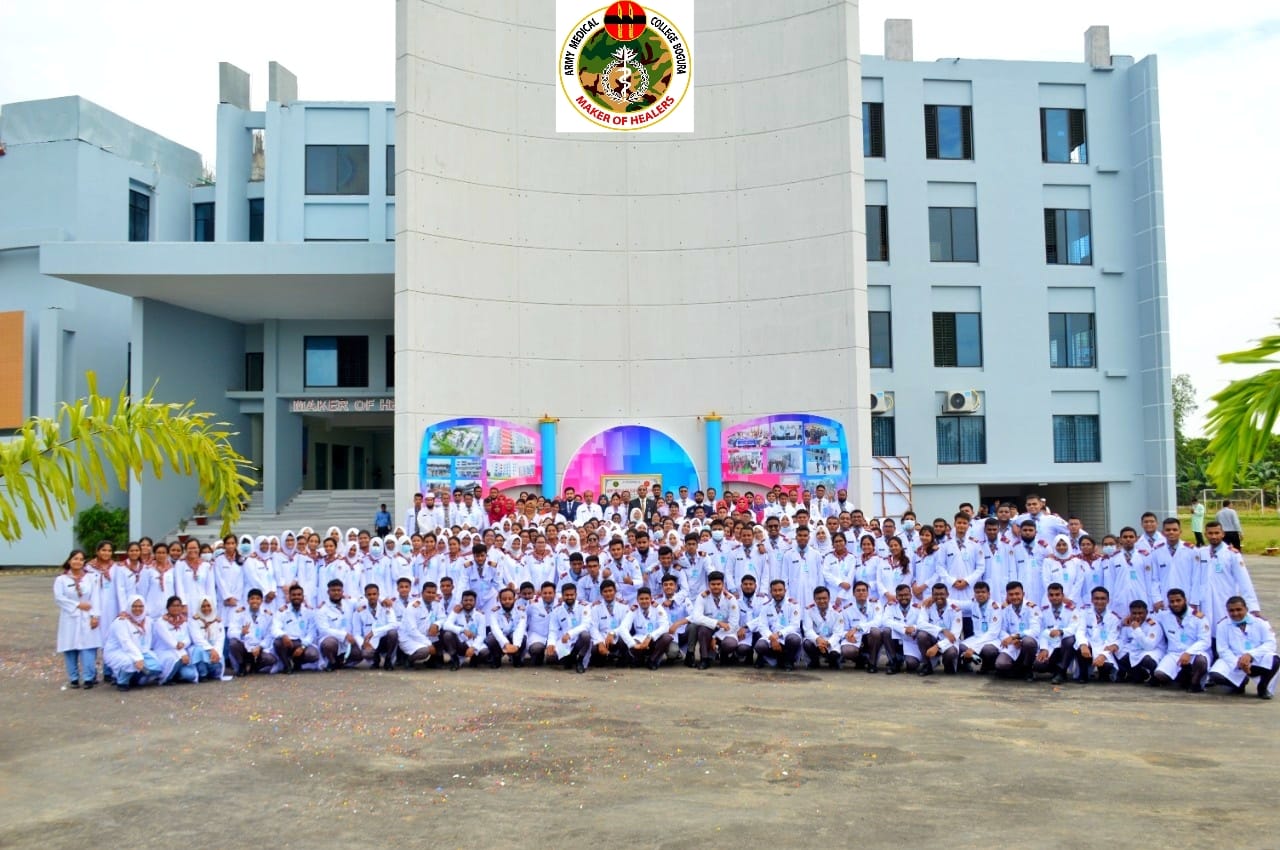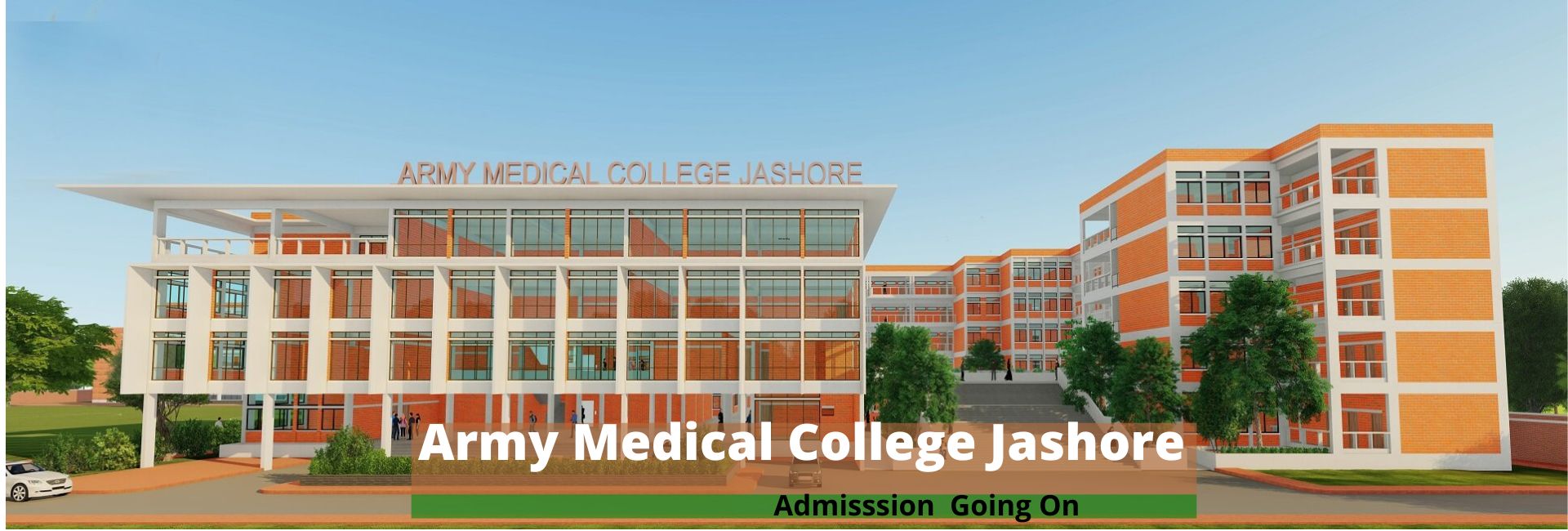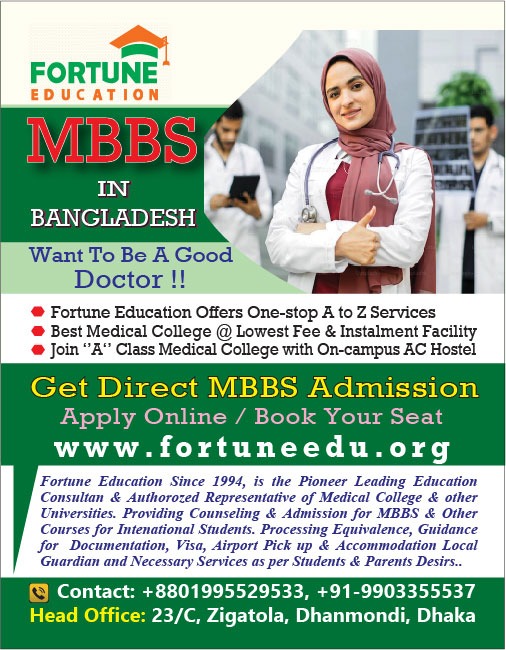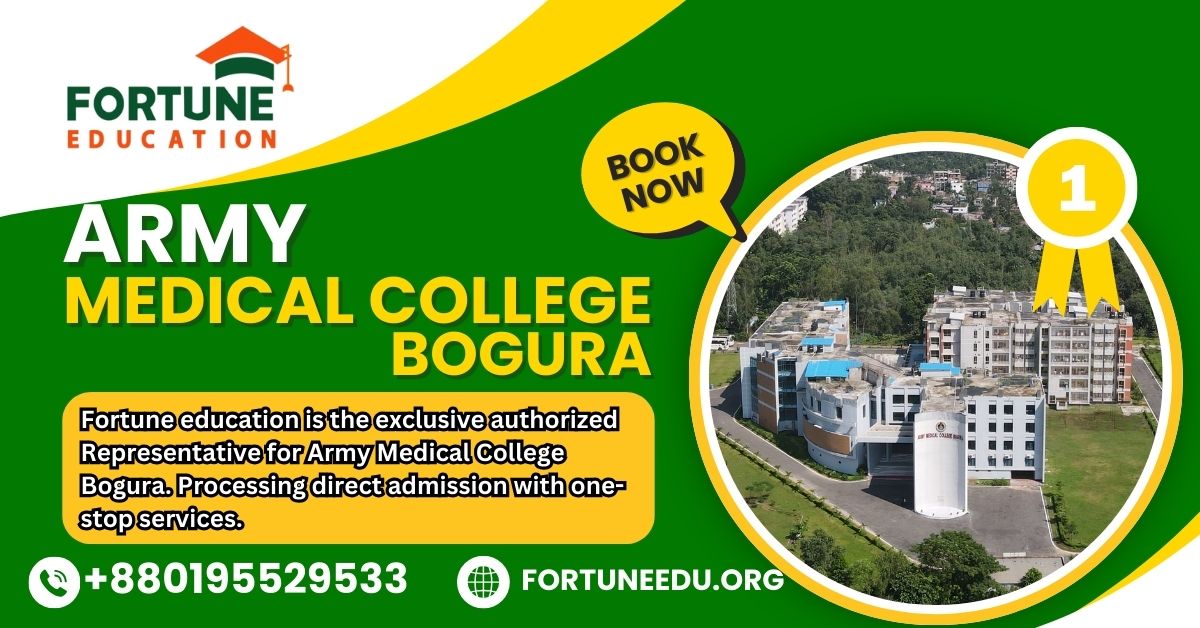Blog
MBBS Study in Bangladesh
- January 5, 2024
- Posted by: study mbbs in bangladesh
- Category: Advantages of Army Medical College Jashore. Fortune Education All Colleges Army Medical College Jashore Authorized Consultant of Army Medical College Jashore Bangladesh Bangladesh Medical Colleges for International Students Brahmanbaria Medical College Eligibility criteria Islami Bank Medical College MBBS Admission in Best Medical Colleges in Bangladesh Scholarship Services Offered by Fortune Education Study MBBS Abroad in Bangladesh Study MBBS in Bangladesh 2024 Technology Top colleges
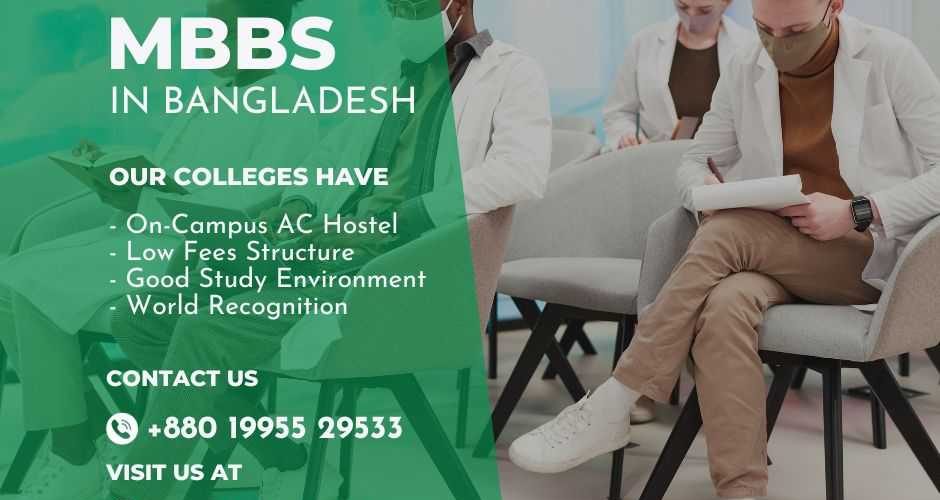
MBBS Study in Bangladesh
- Eligibility Criteria: Check the eligibility criteria for international students wishing to study MBBS in Bangladesh. This often includes requirements like a minimum percentage in high school, particularly in science subjects, and a qualifying score in an entrance examination like NEET (for Indian students).
- Recognition of Medical Colleges: Ensure that the medical college you choose is recognized by major medical councils such as the Bangladesh Medical and Dental Council (BMDC), the World Health Organization (WHO), and if applicable, the medical council of your home country (like the Medical Council of India).
- Curriculum and Language of Instruction: Familiarize yourself with the curriculum to ensure it aligns with global medical standards. Most medical colleges in Bangladesh teach in English, especially for international students, but confirming this is crucial.
- Admission Process: Understand the admission process, which typically involves submitting academic records, entrance exam scores, and sometimes attending an interview.
- Fee Structure: Review the fee structure of the medical colleges. While MBBS courses in Bangladesh are often more affordable compared to Western countries, costs can vary between institutions.
- Quality of Education and Infrastructure: Research the quality of education, faculty credentials, and infrastructure of the medical college. This includes labs, libraries, and clinical training facilities.
- Clinical Training and Internships: Check the opportunities for clinical training and internships, as hands-on experience is a critical part of medical education.
- Accommodation and Living Conditions: Consider the living conditions, including campus accommodation, food, and overall environment, particularly if you are an international student.
- Cultural Adaptation: Be prepared for cultural differences and learning about new customs and traditions, which is part of studying abroad.
- Post-Graduation Opportunities: Look into the opportunities after graduation, including the process of getting a license to practice medicine in your home country if you plan to return.
- Visa and Legal Requirements: Ensure you understand the visa process and legal requirements for studying in Bangladesh.
Studying MBBS in Bangladesh can be a viable option for many students, particularly those from nearby countries, due to its cost-effectiveness and quality medical education. Here are some key aspects to consider if you are looking to pursue an MBBS degree in Bangladesh:
- Eligibility and Entrance Requirements: Typically, eligibility for studying MBBS in Bangladesh includes a strong academic record, especially in sciences, and meeting specific entrance requirements like NEET (National Eligibility cum Entrance Test) for Indian students.
- Accreditation and Recognition: Ensure that the medical college you choose is recognized by the Bangladesh Medical and Dental Council (BMDC) and ideally by international bodies like WHO. For Indian students, it’s crucial that the college is listed in the Medical Council of India (MCI)’s list of approved universities.
- Curriculum and Duration: The MBBS course in Bangladesh is similar to that in India and other Commonwealth countries. It usually spans 5 years, followed by a compulsory internship.
- Medium of Instruction: The medium of instruction in most medical colleges in Bangladesh is English, especially for international students, making it easier for a broader student body to adapt.
- Clinical Exposure: Bangladesh offers good clinical exposure for medical students due to a high population density and diverse range of medical cases.
- Cost of Education: One of the main advantages is the affordability of MBBS programs in comparison to many other countries. It’s important to consider not just tuition fees but also living expenses.
- Cultural and Geographical Proximity: For students from nearby countries, especially South Asia, Bangladesh offers a cultural and geographical familiarity, which can make the transition easier.
- Accommodation and Living: Most colleges provide hostel facilities. The cost of living is relatively low, but it’s essential to research and prepare for life in a new country.
- Safety and Environment: Consider the safety and overall environment of the area where the college is located, especially if you’re an international student.
- Post-Graduation Opportunities: Investigate the opportunities after graduation, including the scope for practicing medicine in Bangladesh or in your home country, and understand the process of appearing for licensing exams or further studies.
- Legal Formalities and Visa: Understand the legal requirements for studying in Bangladesh, including visa processes and regulations for international students.
About Bangladesh
- Geography: Bangladesh is bordered by India to the west, north, and east, Myanmar to the southeast, and the Bay of Bengal to the south. It is predominantly a low-lying riverine country located on the deltas of large rivers flowing from the Himalayas.
- Capital and Major Cities: The capital of Bangladesh is Dhaka, a vibrant and densely populated city. Other major cities include Chittagong, which is a key port city, and Sylhet, known for its picturesque tea gardens.
- Population: Bangladesh is one of the most densely populated countries in the world, with a population exceeding 160 million people. It is known for its diverse cultural demographics, including various ethnic groups and religions.
- Language: The official language is Bengali (Bangla), which is spoken by the majority of the population. English is also widely used in government, business, and education.
- History: Bangladesh was part of British India until 1947, when it became East Pakistan following the Partition of India. After a bloody liberation war, Bangladesh declared independence from Pakistan in 1971.
- Economy: Traditionally an agrarian economy, Bangladesh has made significant strides in development in recent years and is now classified as a developing nation. The garment industry, remittances from overseas workers, and the agricultural sector are significant contributors to its economy.
- Culture and Heritage: The country has a rich heritage of music, dance, art, and literature. The Bengali New Year, known as Pohela Boishakh, is a vibrant cultural festival. Bangladesh is also home to Rabindranath Tagore, the first non-European Nobel laureate.
- Natural Beauty: Bangladesh offers scenic beauty with its lush greenery and numerous waterways. The Sundarbans, home to the Royal Bengal Tiger, is a UNESCO World Heritage Site and one of the largest mangrove forests in the world.
- Climate: The climate is tropical with a mild winter from October to March, and a hot, humid summer from March to June. The country is prone to flooding due to the monsoon season and its low-lying geography.
- Challenges: Bangladesh faces several challenges, including political instability, poverty, and environmental issues like flooding, cyclones, and climate change impacts.
- Cuisine: Bengali cuisine is known for its diverse range of rice dishes, fish delicacies, and sweets made from milk. Mustard oil and spices are commonly used in cooking.
Bangladesh, with its rich history and evolving modern identity, presents a unique blend of tradition and progress. It’s a nation that continues to grow in various aspects, from economic development to cultural richness.
- Quality of Education: Bangladesh has a number of medical colleges that offer high-quality medical education. The curriculum often follows international standards, ensuring a comprehensive medical education.
- Affordable Tuition Fees: Compared to medical education in countries like the USA, UK, or Australia, Bangladesh offers a more affordable option. The lower cost of tuition without compromising the quality of education is a significant factor for many students.
- Medium of Instruction: The medium of instruction in most medical colleges in Bangladesh is English, which is beneficial for international students. This makes it easier for students from different parts of the world to adapt and learn effectively.
- Cultural Similarity for Neighboring Countries: For students from countries like India, Nepal, and Pakistan, the cultural similarities can make the transition easier. The lifestyle, food habits, and even the language have close similarities, reducing the cultural shock.
- WHO Recognition: Many medical colleges in Bangladesh are recognized by the World Health Organization, which is crucial for the global acceptance of the degree.
- MCI Approved Colleges: For Indian students, many colleges in Bangladesh are approved by the Medical Council of India (MCI), which means they can return to India and practice medicine after passing the required exams.
- Clinical Exposure: Due to the high population density, medical students in Bangladesh get exposure to a wide variety of cases, which is essential for a well-rounded medical education.
- Global Recognition: Degrees from Bangladeshi medical colleges are recognized in many countries, which opens up international opportunities for graduates.
- Safety and Environment: Bangladesh is generally considered a safe country for international students. The people are hospitable and welcoming.
- Proximity to Home for South Asian Students: For students from South Asia, Bangladesh is geographically close, reducing travel costs and making it easier for them to visit home during breaks.
- Post-Graduation Opportunities: Graduates have a variety of options post-graduation, including pursuing higher studies, working in hospitals, or practicing medicine in different countries, subject to passing the respective licensing exams.
However, it’s important for prospective students to conduct thorough research and consider factors like the specific college, accommodation, living expenses, and the overall political and economic stability of Bangladesh. It’s also advisable to connect with current students or alumni and consult educational advisors or agencies specializing in international medical education.

MBBS in Bangladesh for Indian students
- Recognition by MCI: Many medical colleges in Bangladesh are recognized by the MCI. Indian students graduating from these colleges are eligible to sit for the Foreign Medical Graduates Examination (FMGE) to practice in India.
- Affordable Tuition Fees and Living Costs: Compared to private medical colleges in India and medical education in Western countries, Bangladesh offers a more cost-effective option. This affordability extends to both tuition fees and living expenses.
- Quality of Education: The standard of medical education in Bangladesh is comparable to that in India. The syllabus and study pattern are quite similar, which makes it easier for Indian students to adapt.
- Medium of Instruction: The medium of instruction in medical colleges in Bangladesh is English, which is beneficial for Indian students.
- Cultural Similarities: The culture in Bangladesh has many similarities with Indian culture, including language, food, and lifestyle, which can make Indian students feel more at home.
- Eligibility Criteria: Indian students typically need to meet certain eligibility criteria, such as a minimum score in their 10+2 examinations with Physics, Chemistry, and Biology, and qualifying NEET scores.
- No Language Barrier: Since English and Bengali are common languages in both countries, Indian students usually don’t face significant language barriers in Bangladesh.
- Clinical Exposure: Bangladesh has a high population density, offering a wide range of clinical exposure to medical students, which is crucial for practical learning.
- Proximity to India: Geographical proximity is another advantage as it is easier and more affordable for Indian students to travel between Bangladesh and India.
- Admission Process: The admission process for Indian students usually involves qualifying NEET, filling out application forms, and sometimes attending interviews.
- Visa and Documentation: Indian students require a student visa for Bangladesh, and they should be aware of all necessary documentation and legal formalities.
- Post-Graduation Options: After completing MBBS in Bangladesh, Indian students can pursue higher education, prepare for the FMGE to practice in India, or explore opportunities in Bangladesh and other countries.
Advantages of MBBS in Bangladesh
- Quality of Education: Bangladesh has several medical colleges that offer high-quality medical education. These colleges often follow an internationally recognized curriculum, ensuring a comprehensive and competitive medical education.
- Affordability: Compared to many Western countries and even some Asian nations, the cost of studying MBBS in Bangladesh is relatively lower. This affordability extends to tuition fees as well as living expenses, making it an economically viable option for many students.
- Medium of Instruction: The medium of instruction in most medical colleges in Bangladesh is English, which is advantageous for international students and minimizes the language barrier.
- Recognition of Degrees: Medical degrees from Bangladesh are recognized by various international bodies such as the World Health Organization (WHO), the Medical Council of India (MCI), and others, making the degree globally accepted.
- Clinical Exposure: Due to a high population density and diverse range of medical issues, medical students in Bangladesh gain significant clinical exposure, which is critical for practical learning and experience.
- Cultural Similarity: For students from South Asia, the cultural and social environment in Bangladesh is quite similar to their home countries. This similarity can make the transition and adaptation process easier for these students.
- SAARC Quota: Some Bangladeshi medical colleges offer a special quota for students from SAARC countries, which can sometimes include tuition fee waivers or discounts.
- Proximity to Home for Regional Students: For students from countries like India, Nepal, and other neighboring nations, Bangladesh is geographically close, making travel easier and more cost-effective.
- No Entrance Exam for Admission: Unlike many countries where rigorous entrance exams are mandatory, in Bangladesh, international students can secure admissions based on their secondary school and higher secondary school grades, along with qualifying in exams like NEET (for Indian students).
- Internship Opportunities: Students often have the opportunity to do internships in well-equipped hospitals, gaining hands-on experience in a real-world medical environment.
- Safe and Welcoming Environment: Bangladesh is generally considered a safe country for international students, and the locals are known for their hospitality.
MBBS Fees Structure In Bangladesh 2024-25
- Type of College: There are both government and private medical colleges in Bangladesh. Government colleges usually have lower fees compared to private ones.
- Tuition Fees: The tuition fees for MBBS in Bangladesh are generally more affordable compared to many Western countries. For international students, especially those from SAARC countries, there might be different fee structures.
- Additional Costs: Apart from tuition fees, students should also consider other expenses such as admission fees, lab fees, hostel accommodation, food, and other living expenses.
- SAARC Quota: Some colleges offer a special quota for students from SAARC countries, which can sometimes include reduced tuition fees.
- Payment Structure: Colleges may have different payment structures. Some might require a significant portion of the fees to be paid upfront, while others may allow payment in installments.
- Currency Fluctuations: For international students, it’s important to consider currency exchange rates as fees are typically paid in the local currency (Bangladeshi Taka).
- Annual Increases: Like most educational programs, there can be an annual increase in tuition fees due to inflation and other economic factors.
The eligibility criteria for studying MBBS in Bangladesh are set by the respective medical colleges and the Bangladesh Medical and Dental Council (BMDC). These criteria are essential to ensure that students are adequately prepared for the rigors of a medical education. While specific requirements can vary slightly from college to college, the general eligibility criteria are as follows:
- Academic Qualifications:
- Candidates must have completed 10+2 years of education or equivalent.
- Students must have studied Physics, Chemistry, and Biology as their major subjects in their higher secondary education.
- There is usually a minimum aggregate score requirement in these subjects, often around 60% or more, but this can vary.
- NEET (For Indian Students):
- Indian students are typically required to qualify the National Eligibility cum Entrance Test (NEET) to be eligible for MBBS admission in Bangladesh. This is a mandatory requirement as per the regulations of the Medical Council of India (MCI).
- Minimum Age:
- The minimum age for admission into MBBS programs in Bangladesh is generally 17 years. There may be an upper age limit set by some institutions as well.
- Medical Fitness:
- Candidates must be medically fit. Medical colleges often require a medical certificate to ensure that the applicant does not have any major illnesses or conditions that would hinder their medical studies.
- No Gap Years:
- Some colleges in Bangladesh require that there should be no gap years after completing 10+2. However, this requirement may vary.
- Language Proficiency:
- While the medium of instruction is English, proficiency in Bengali might be beneficial as it can aid in interacting with patients during clinical rotations. However, this is not usually a mandatory requirement.
- Documentation:
- Necessary documentation typically includes academic transcripts, certificates, passport-size photographs, NEET scorecard (for Indian students), and a valid passport.
- Admission Test/Interview:
- Some colleges might conduct their own admission tests or interviews as part of the selection process, though this is not universally the case.
It is crucial to check the specific eligibility criteria of each medical college in Bangladesh as there can be variations. Additionally, staying updated with the latest information from official sources or educational consultants specializing in medical education in Bangladesh is recommended, as eligibility criteria can change.
Planning to study MBBS in Bangladesh for the academic years 2024-25 involves several considerations. Here’s a comprehensive guide to help you navigate through the process:
- Recognized Institutions: Ensure that the medical college you choose is recognized by the Bangladesh Medical and Dental Council (BMDC) and is listed in the World Directory of Medical Schools. For Indian students, it should also be recognized by the Medical Council of India (MCI).
- Eligibility Criteria:
- Academic: Generally, a minimum aggregate in Physics, Chemistry, and Biology in 10+2 (or equivalent) examinations.
- NEET: Indian students usually need to qualify the NEET examination.
- Age: Minimum age requirements, often 17 years at the time of admission.
- Application Process:
- Start by researching and shortlisting colleges based on your preferences and their recognition status.
- Prepare and organize all necessary documents, including academic records, NEET scores (for Indian students), passport, etc.
- Follow the specific application procedure for each college, which may involve direct applications, entrance exams, or interviews.
- Admission Tests and Interviews: Some colleges may have their own admission tests or interview processes.
- Fee Structure:
- Consider the tuition fees, which are generally more affordable compared to Western countries.
- Account for additional costs such as accommodation, food, travel, and miscellaneous expenses.
- Medium of Instruction: The medium of instruction in most colleges is English, which is beneficial for international students.
- Accommodation: Research the accommodation options, both on-campus and off-campus.
- Visa and Legal Formalities:
- Obtain a student visa for Bangladesh.
- Ensure compliance with all legal requirements for international students.
- Cultural Adaptation:
- Familiarize yourself with the culture, language, and lifestyle in Bangladesh to ease the adaptation process.
- Clinical Exposure: Bangladesh offers good clinical exposure due to a diverse range of medical cases and a high patient influx in hospitals.
- Safety and Environment: Ensure the safety and overall living conditions in the area where you plan to study.
- Post-Graduation Opportunities:
- Understand the process for practicing medicine in your home country after graduation, such as the FMGE (Foreign Medical Graduates Examination) for Indian students.
- Explore opportunities for higher studies or specialization.
- Staying Informed:
- Stay updated with any changes in regulations, especially those pertaining to international students.
- Regularly check official websites or contact the embassies for the latest information.
- Consultation and Advice:
- Seek guidance from educational consultants who specialize in medical education in Bangladesh.
- Connect with current students or alumni of the colleges for firsthand insights.
Planning ahead, conducting thorough research, and preparing for the academic, financial, and cultural aspects of studying abroad are key to a successful educational experience in Bangladesh.
The MBBS syllabus in Bangladesh is structured to provide a comprehensive education in medicine, similar to other international medical curricula, especially those in South Asian countries like India. The program typically spans five years, followed by a one-year internship, which is essential for practical training. The syllabus is divided into phases or years, each focusing on different aspects of medical education.
1. First Year (Pre-clinical Phase):
- Anatomy: Study of the human body structure, including gross anatomy, microanatomy, and embryology.
- Physiology: Understanding the functions of various body systems.
- Biochemistry: Study of the chemical processes within and related to living organisms.
2. Second Year (Pre-clinical Phase):
- Continuation of studies in Anatomy, Physiology, and Biochemistry, with more in-depth exploration and practical laboratory work.
3. Third Year (Para-clinical Phase):
- Pathology: Study of disease causes, development, and effects on the body.
- Microbiology: Study of microorganisms, including bacteria, viruses, fungi, and parasites.
- Pharmacology: Understanding drugs and their effects on the human body.
- Forensic Medicine: Medical principles applied to law, including medical jurisprudence and toxicology.
4. Fourth Year (Clinical Phase):
- Community Medicine: Public health and community health practices.
- Internal Medicine: Diagnosis and treatment of internal body diseases.
- Surgery: Basic surgical techniques and patient care.
- Gynecology and Obstetrics: Reproductive health, pregnancy, and childbirth.
- Pediatrics: Medical care for infants, children, and adolescents.
5. Final Year (Clinical Phase):
- Advanced studies and clinical rotations in areas such as Internal Medicine, Surgery, Gynecology and Obstetrics, and Pediatrics.
- Ophthalmology: Diseases and treatment of the eye.
- Otorhinolaryngology (ENT): Diseases of the ear, nose, and throat.
6. Internship:
- A one-year compulsory internship in hospitals, where students gain practical experience under supervision in various departments.
Throughout the MBBS program, students also participate in clinical rotations, workshops, seminars, and hands-on practical sessions. The curriculum is designed to develop skills in patient care, diagnosis, treatment planning, surgical procedures, and handling of medical equipment.
Top Army Medical Colleges in Bangladesh
Bangladesh has several reputable Army Medical Colleges that are known for providing quality medical education. These institutions are part of the Bangladesh Armed Forces and are affiliated with the Bangladesh University of Professionals (BUP). They combine medical education with military discipline, offering a unique environment for students. Here are some of the top Army Medical Colleges in Bangladesh:
Army Medical College Bogura
Army Medical College Bogura, one of the Army Medical Colleges in Bangladesh, is a prominent institution for medical education. These colleges are affiliated with the Bangladesh University of Professionals (BUP) and are recognized for their blend of medical education and military discipline. Here are some key aspects of Army Medical College Bogura:
- Establishment: Army Medical College Bogura was established as part of the expansion of medical education in Bangladesh, particularly within the framework of the Bangladesh Armed Forces. The aim is to provide quality medical education and to produce competent healthcare professionals.
- Location: The college is located in Bogura, a significant city in the Rajshahi Division in northern Bangladesh. This location provides a strategic advantage in terms of accessibility and regional diversity.
- Programs Offered: The primary program offered is the MBBS (Bachelor of Medicine and Bachelor of Surgery) degree. The curriculum is in line with international medical education standards and is designed to provide comprehensive medical education and training.
- Affiliation and Accreditation: Like other Army Medical Colleges, it is affiliated with the Bangladesh University of Professionals (BUP) and is recognized by the Bangladesh Medical and Dental Council (BMDC). This ensures that the degrees awarded are credible and recognized nationally and internationally.
- Faculty and Facilities: The college boasts experienced faculty members who are skilled both in medical education and military practices. Additionally, the college is equipped with modern facilities, including well-established laboratories, libraries, and research centers.
- Military Training: Students in these colleges receive military training in addition to their medical education. This dual training aims to instill discipline, leadership qualities, and a sense of service among the students.
- Clinical Training: Clinical training is an essential part of the MBBS program, and students at Army Medical College Bogura gain practical experience in affiliated hospitals, dealing with a diverse range of medical conditions and patient care scenarios.
- Admission Process: Admission to Army Medical College Bogura is competitive, with candidates selected based on academic merit, entrance examinations, and interviews. There is often a specific quota for civilian students and military dependents.
- Post-Graduation Opportunities: Graduates can pursue careers in various healthcare sectors, including in military and civilian roles. They are eligible to sit for postgraduate entrance exams and can also practice medicine subject to meeting the regulatory requirements of the respective country or region.
- Community Engagement: The college encourages students to engage in community service and outreach programs, aligning with the ethos of service in the medical profession.
For the most accurate and updated information, it’s advisable to contact the college directly or visit their official website. Additionally, prospective students should consider visiting the campus and speaking with current students and faculty to get a better understanding of the college environment and opportunities.
Army Medical College Jashore
Army Medical College Jashore is one of the notable institutions in Bangladesh dedicated to providing medical education within a disciplined, military environment. Part of the network of Army Medical Colleges in Bangladesh, it operates under the affiliation of the Bangladesh University of Professionals (BUP) and maintains a standard in line with other prestigious medical colleges. Here are some key aspects of Army Medical College Jessore:
- Establishment: The college was established to contribute to the healthcare sector of Bangladesh by providing quality medical education combined with military discipline.
- Location: Located in Jessore, a city in the southwestern region of Bangladesh, the college benefits from its strategic positioning, contributing to the healthcare services of the region.
- Programs Offered: The primary program offered is the MBBS (Bachelor of Medicine and Bachelor of Surgery) degree. The curriculum is designed to meet international medical education standards, focusing on producing competent and skilled healthcare professionals.
- Affiliation and Accreditation: Army Medical College Jessore is affiliated with the Bangladesh University of Professionals (BUP) and recognized by the Bangladesh Medical and Dental Council (BMDC). This affiliation ensures that the medical degree obtained is credible and recognized both nationally and internationally.
- Admission and Selection: Admission to Army Medical College Jessore is competitive, with candidates selected based on their academic record, performance in entrance exams, and interviews. There is usually a specific quota for civilian students in addition to seats reserved for military dependents.
- Faculty and Infrastructure: The college boasts a team of experienced faculty members and modern infrastructure, including well-equipped laboratories, libraries, and research facilities, to provide a conducive learning environment.
- Military Training: Alongside medical education, students also undergo military training. This training is aimed at instilling discipline, leadership, and a sense of duty, which are essential qualities in the medical profession.
- Clinical Exposure: Students get ample clinical exposure through affiliated hospitals, gaining practical experience and hands-on training in patient care.
- Post-Graduation Prospects: Graduates from Army Medical College Jessore are well-equipped to pursue various roles in the healthcare sector, including opportunities in military and civilian medical services, both within Bangladesh and internationally.
- Community Engagement: The college emphasizes the importance of community service and encourages students to participate in various outreach programs and health camps.
For the most accurate information regarding admission procedures, fee structure, curriculum details, and other specifics, prospective students should refer to the official website of Army Medical College Jessore or directly contact the college’s admission office. Visiting the campus and interacting with current students and faculty can also provide valuable insights.
Armed Forces Medical College (AFMC)
- Established in 1999, AFMC is one of the most prestigious medical colleges in Bangladesh. It offers MBBS and postgraduate courses and is known for its rigorous academic and military training.
These Army Medical Colleges offer a five-year MBBS program, followed by a one-year internship. The curriculum is aligned with international medical education standards, and the colleges are equipped with modern facilities, including well-equipped laboratories and libraries. Admission to these colleges is competitive, with a selection process that includes academic criteria and a series of tests and interviews.
Students in these colleges receive education and training that prepares them for both civilian and military medical service. They are known for their disciplined environment, quality of education, and contribution to the healthcare sector in Bangladesh.
- Bangabandhu Sheikh Mujib Medical University (BSMMU), Dhaka:
- It’s the premier postgraduate medical institution in Bangladesh. It offers a range of postgraduate degrees in medical sciences.
- Dhaka Medical College and Hospital, Dhaka:
- One of the oldest and most prestigious medical schools in Bangladesh, known for its historical significance and quality education.
- Chittagong Medical College, Chittagong:
- A leading medical college located in Bangladesh’s second-largest city, known for its medical education and research.
- Rajshahi Medical College, Rajshahi:
- This college is well-known for its contributions to medical education and healthcare services in the northwestern part of Bangladesh.
- Sher-e-Bangla Medical College, Barisal:
- It’s known for its comprehensive medical education and healthcare services in the southern region of Bangladesh.
- Mymensingh Medical College, Mymensingh:
- A reputed institution offering MBBS and other medical degrees, with a strong emphasis on research and clinical training.
- Sylhet MAG Osmani Medical College, Sylhet:
- Located in the northeastern city of Sylhet, this college is known for its medical education and healthcare services.
- Armed Forces Medical College (AFMC), Dhaka:
- A military medical college that provides medical education to cadets along with military training.
- Bangladesh Medical College, Dhaka:
- The first private medical college in Bangladesh, known for its contributions to medical education and healthcare.
- Ibrahim Medical College, Dhaka:
- Affiliated with BSMMU, it’s known for its modern approach to medical education and research.
- Shaheed Suhrawardy Medical College, Dhaka:
- A well-known government medical college offering undergraduate and postgraduate medical education.
These universities and colleges offer a variety of programs catering to different aspects of medical education and research. The MBBS program, typically a five-year course followed by a year of internship, is the most sought-after. These institutions are recognized by the Bangladesh Medical and Dental Council and attract students from within the country and abroad.
Prospective students should visit the respective university’s website or contact the admission offices for detailed and current information on courses, admission criteria, fee structures, and other relevant details.
- Academic Faculties and Departments:
- BUP encompasses several faculties, including the Faculty of Security and Strategic Studies, Faculty of Business Studies, Faculty of Science and Technology, Faculty of Arts and Social Sciences, and Faculty of Medical Studies.
- These faculties offer a range of undergraduate, postgraduate, and research programs catering to various disciplines.
- Affiliated Institutions:
- BUP affiliates various military and civil educational institutions, including the military colleges like Army Medical College, Military Institute of Science and Technology (MIST), and others.
- This affiliation enhances the academic standards of these institutions and offers a unified curriculum.
- Educational Approach:
- The university focuses on a blend of both professional and academic education. It is particularly known for its emphasis on developing leadership, management, and technical skills among students.
- Its curriculum and teaching methodologies are designed to meet the needs of both military and civilian students.
- Research and Development:
- BUP emphasizes research and development, encouraging students and faculty members to engage in various research projects.
- The university aims to foster an environment that supports innovation and academic inquiry.
- Facilities and Infrastructure:
- The campus is equipped with modern educational facilities, including well-equipped classrooms, laboratories, libraries, and IT infrastructure.
- Sports and recreational facilities are also provided to ensure a well-rounded development of students.
- International Collaboration:
- BUP has collaborations with various international universities and institutions, which facilitates academic exchange programs, research collaborations, and international seminars and workshops.
- Community and Cultural Engagement:
- The university actively promotes cultural activities and community engagement, encouraging students to participate in various cultural events, sports, and social services.
- Admission and Eligibility:
- Admission to BUP is competitive, with eligibility criteria varying depending on the program. The university attracts students from both military and civilian backgrounds.
- Location:
- Located in Dhaka, it provides students with access to the capital city’s vast educational, cultural, and professional opportunities.
BUP’s unique positioning as an institution that caters to both military and civilian students makes it a distinctive choice for higher education in Bangladesh. It’s advisable for prospective students to visit the official BUP website or contact the university directly for the most current information on programs, admissions, and other opportunities.
- Quality of Education: Bangladesh offers a high standard of medical education that is recognized globally. The MBBS degree from Bangladesh is respected and accepted in many countries worldwide.
- WHO and MCI Recognition: Medical colleges in Bangladesh are recognized by the World Health Organization (WHO) and for Indian students, by the Medical Council of India (MCI), making the degree valid in many countries for further studies and employment opportunities.
- Cost-Effectiveness: The cost of studying MBBS in Bangladesh is relatively lower compared to countries like the USA, UK, or Australia. This affordability extends to both tuition fees and living expenses.
- Medium of Instruction: The medium of instruction in medical colleges in Bangladesh is English, which is beneficial for international students.
- Cultural Similarities: For students from South Asia, the cultural and social environment in Bangladesh is quite similar to their home countries, which can make adapting easier.
- Clinical Exposure: With a high population density, Bangladesh provides ample clinical exposure to students, which is crucial for a practical and comprehensive medical education.
- Eligibility Criteria: International students typically need to have completed their 10+2 education with biology, physics, and chemistry. Many colleges require eligibility determined through exams like NEET (for Indian students).
- Admission Process: This usually involves submitting academic records and may include an interview or entrance exam. Admissions for international students are often handled through specific quotas or seats allocated to foreign students.
- Visa and Accommodation: International students will need to obtain a student visa. Most medical colleges provide hostel facilities, or students can opt for private accommodation.
- Internship Opportunities: Many colleges offer internship programs, which are vital for gaining practical experience.
- Post-Graduation Opportunities: Graduating students can pursue higher education or start their medical practice, depending on the regulations of the country where they wish to practice.
- Safety and Environment: Bangladesh is generally a safe country for international students, with a hospitable environment.
It’s important for international students to research individual colleges for specific admission criteria, fees, and facilities. Contacting the respective embassies or the colleges directly for detailed information is also advisable. Additionally, understanding the local customs, language basics, and weather conditions can be beneficial for a smoother transition to life and study in Bangladesh.
About Fortune Education
- Admission Guidance: They provide guidance to students regarding admissions in various institutions, particularly in medical fields like MBBS, BDS (Bachelor of Dental Surgery), and other healthcare-related programs.
- University Selection: Such consultancies help students select universities or colleges based on the student’s preferences, academic background, and financial capabilities.
- Documentation Assistance: They assist in the preparation and submission of necessary documentation required for university applications and visa processing.
- Career Counseling: Providing career counseling to help students understand the prospects and challenges of different educational paths and careers.
- Entrance Exam Preparation: Offering guidance and resources for preparing for entrance exams that are prerequisites for admission into many medical colleges.
- Visa Assistance: Helping students with the visa application process, including filling out forms and preparing for visa interviews.
- Accommodation and Travel Arrangements: Assisting with logistical aspects such as finding accommodation and making travel arrangements.
- Pre-departure Briefing: Providing information and advice about the host country, cultural adaptation, and other aspects of student life abroad.
- Post-Arrival Support: Some consultancies offer support even after the student has reached their study destination, helping them settle into their new environment.
